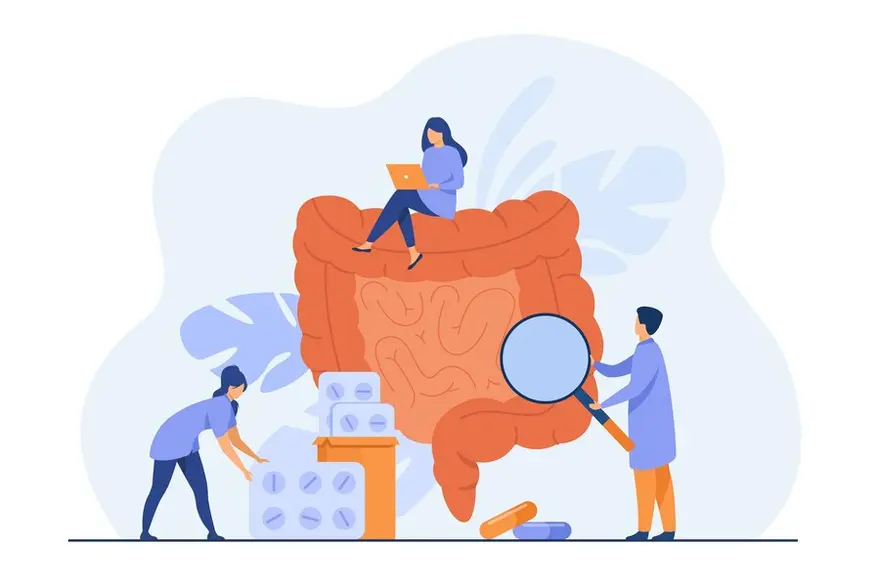Preventive Healthcare
Crohn's Disease: Symptoms, Causes, Treatment Options & Types
1277 Views
0

What is Crohn’s Disease?
Crohn's disease is a chronic inflammatory condition that affects the digestive system, especially the small intestine and colon. It is a type of inflammatory bowel disease (IBD) that affects various areas of the digestive system and produces swelling, irritation, and inflammation.
What are the Types of Crohn’s Disease?
Crohn’s disease can affect different parts of the digestive tract, leading to several distinct types.
The most common Crohn's disease types are:
- Ileocolitis: The most common form, affecting the ileum (last section of the small intestine) and colon (a portion of large intestine)
- Ileitis: This Crohn's disease type affects only the ileum
- Gastroduodenal Crohn's Disease: Affects the stomach and the beginning of the small intestine (duodenum)
- Jejunoileitis: Characterised by patchy areas of inflammation in the upper half of the small intestine (jejunum)
- Crohn's Colitis: Affects only the colon, similar to ulcerative colitis
How Common is Crohn’s Disease?
Crohn’s disease is relatively rare, but its occurrence is rising globally. In India, the disease is less common than in Western countries but is becoming more prevalent due to lifestyle shifts and urbanization. Current estimates indicate that about 1 in 10,000 people in India are affected by Crohn’s disease.
Increased awareness and better diagnostic methods are leading to more cases being identified. However, it remains underdiagnosed, particularly in rural areas.
What are the Symptoms of Crohn’s Disease?
Crohn’s disease symptoms vary widely and can range from mild to severe.
Common symptoms include:
- Persistent diarrhoea
- Abdominal pain and cramping
- Fatigue
- Weight loss
- Blood in stool
- Fever
- Reduced appetite
- Mouth sores
Since Crohn's disease symptoms overlap with other gastrointestinal conditions, it often requires a thorough evaluation for accurate diagnosis. The intensity of these symptoms can fluctuate, with periods of remission followed by flare-ups.
What are the Complications of Crohn’s Disease?
If left untreated, Crohn’s disease can lead to complications such as strictures (narrowed sections of the intestines), fistulas (abnormal connections between the intestines and other organs), and abscesses (pockets of infection).
Additionally, Crohn’s disease complications may extend beyond the digestive tract, leading to issues such as arthritis, skin conditions, and eye inflammation. Long-term inflammation can also increase the risk of colon cancer, making regular screenings essential for patients.
What Causes Crohn’s Disease?
The exact causes of Crohn’s disease are not fully understood, but a combination of factors is believed to contribute to the condition. These factors include genetics, immune system malfunctions, and environmental triggers.
- For instance, if the immune system mistakenly attacks the digestive tract, it can lead to chronic inflammation.
- Genetics also play a role, as people with a family history of Crohn’s disease are at higher risk.
- Environmental factors, such as a western diet high in processed foods, may also contribute to the disease's onset.
What are the Risk Factors of Crohn’s Disease?
Several risk factors increase the likelihood of developing Crohn’s disease.
- Family history is one of the most significant risk factors, with those having a close relative with the disease being more susceptible.
- Smoking is another critical risk factor, as it not only increases the risk of Crohn's disease but also worsens its severity.
- Age is also a factor, with most cases being diagnosed before the age of 30.
- Additionally, residing in urban areas or developed countries may expose individuals to environmental triggers that heighten the risk of developing Crohn’s disease.
How is Crohn’s disease diagnosed?
Lab Tests
When diagnosing Crohn's disease, lab tests are often the first step after observing Crohn's disease symptoms such as persistent diarrhoea, abdominal pain, and weight loss.
- Blood tests are commonly used to check for anaemia, which can occur due to chronic blood loss, and to assess inflammation levels.
- Stool tests may also be performed to rule out infections and detect blood or inflammatory markers in the stool.
These tests help doctors differentiate Crohn's disease from other conditions and guide the next steps in Crohn's disease treatment.
Imaging Procedures
Imaging procedures play a crucial role in diagnosing Crohn’s disease by providing visual evidence of inflammation and other abnormalities in the digestive tract. Common imaging techniques include CT scans and MRI scans.
- CT enterography and MR enterography are specialised versions of these scans that focus on the small intestine, which is where Crohn's disease frequently manifests. These treatments aid in the diagnosis of thickened bowel walls, fistulas, abscesses, and other complications related with the cause of Crohn's disease.
- Ultrasounds may also be used, especially in children and pregnant women, as a less invasive method. Imaging can distinguish between different Crohn’s disease types by showing the extent and location of inflammation in the intestines, aiding in treatment planning.
Endoscopy
Endoscopy is crucial in the diagnosis of Crohn's disease. This method uses a flexible tube equipped with a camera to provide direct vision of the digestive tract. Colonoscopy and upper endoscopy are the two primary forms of endoscopy that are used.
- A colonoscopy examines the colon and the end of the small intestine, making it highly effective for detecting inflammation, ulcers, and strictures in these areas.
- Upper endoscopy, on the other hand, explores the oesophagus, stomach, and upper part of the small intestine.
- Both procedures enable the collection of biopsies, which are crucial for diagnosing Crohn’s disease by identifying the specific inflammation patterns typical of the disease.
- Capsule endoscopy is an alternative way to examine the small intestine, especially when other methods have not provided clear results. In this procedure, the patient swallows a small camera.
These endoscopic procedures are crucial for differentiating the symptoms and types of Crohn's disease from other inflammatory bowel diseases, which in developing tailored treatment plans for individuals with Crohn's disease.
How is Crohn’s disease treated?
Medications
Medications are a key element in managing Crohn's disease, primarily targeting inflammation reduction and symptom control.
- Anti-inflammatory drugs, such as aminosalicylates, are often used for mild to moderate cases.
- Corticosteroids, which are stronger anti-inflammatory drugs, are prescribed for more severe flare-ups, but long-term use is avoided due to potential side effects.
- Immune system suppressors, like azathioprine or biologics such as infliximab, are used to target specific aspects of the immune response that contribute to Crohn's disease causes.
- Antibiotics may also be used to treat complications like abscesses and fistulas.
Nutrition
Diet and nutrition play a vital role in managing Crohn's disease, although they are not direct treatments for the condition.
- A low-residue diet, which reduces fibre intake, is commonly recommended during flare-ups to minimize irritation of the inflamed digestive tract.
- In cases where malnutrition is a concern, supplements and special diets, such as enteral nutrition (liquid diets), may be prescribed to ensure adequate nutrient intake.
- Maintaining a balanced diet and avoiding trigger foods can greatly support the treatment of Crohn's disease, although the most effective strategies may vary from one individual to another.
- Regular consultations with a dietitian can help in creating a tailored nutrition plan that supports overall health and reduces the impact of Crohn's disease causes.
Surgery
Surgery becomes necessary for Crohn's disease treatment when medications and dietary changes are ineffective or when complications develop. Approximately 70% of individuals with Crohn's disease will ultimately need surgery.
- Surgical procedures may involve removing a damaged section of the digestive tract, draining abscesses, or repairing fistulas.
- In some cases, a procedure known as strictureplasty is performed to widen a narrowed area of the intestine without removing any part of it.
- Surgery can provide significant relief from Crohn's disease symptoms, but it is not a cure, as the disease often recurs in other parts of the digestive system.
- Post-surgery, medications and lifestyle changes remain essential to prevent relapse.
- For many patients, surgery can improve their quality of life when combined with ongoing Crohn's disease treatment plans.
How can I prevent Crohn’s disease?
Preventing Crohn's disease is challenging because its exact causes are still not fully understood. However, certain lifestyle modifications may help reduce the risk of developing the disease or prevent flare-ups for those already diagnosed.
- Healthy Diet: There's no specific diet to prevent Crohn's disease, maintaining a balanced diet rich in fruits, vegetables, and whole grains may support gut health. Avoiding processed foods and excessive fats may also reduce inflammation.
- Quit Smoking: Smoking is a significant risk factor for Crohn's disease. Quitting can not only lower your risk but also improve outcomes for those already diagnosed.
- Stress Management: High stress levels can trigger flare-ups. Engaging in stress-reducing activities such as yoga, meditation, and regular exercise can help manage Crohn's disease symptoms.
- Regular Medical Check-ups: If you have a family history of Crohn’s disease, regular check-ups can help with early detection and management.
While these steps may not guarantee prevention, they can play a role in reducing the impact of Crohn's disease causes and improving overall well-being.
Is there a cure for Crohn’s disease?
There is currently no cure for Crohn's disease. However, treatments like medications, diet changes, and occasionally surgery can help control symptoms, decrease inflammation, and enhance quality of life.
What is the outlook for people with Crohn’s disease?
The outlook can differ; with appropriate treatment and lifestyle changes, many individuals with Crohn's disease can lead healthy lives, although flare-ups and complications may still occur.
What is the life expectancy of a person with Crohn’s disease?
Most people with Crohn's disease have a normal life expectancy, especially with effective treatment and regular medical care to manage symptoms and complications.
How does Crohn’s disease affect pregnancy?
Crohn's disease can influence pregnancy, but many women with the condition can still have healthy pregnancies with careful management. Flare-ups are more likely if the disease is active during conception.
When to see a doctor?
See a doctor if you experience persistent gastrointestinal symptoms such as severe abdominal pain, diarrhoea, weight loss, or blood in the stool, as these may indicate Crohn's disease. Regular check-ups are essential for managing the condition.
Conclusion
Living with Crohn's disease can be challenging, but with early diagnosis and effective management can help individuals lead fulfilling lives. For accurate testing and diagnosis, trust Metropolis Labs. Offering advanced services, expert consultations, and home sample collections, Metropolis Labs ensures you receive the precise care you need.
























